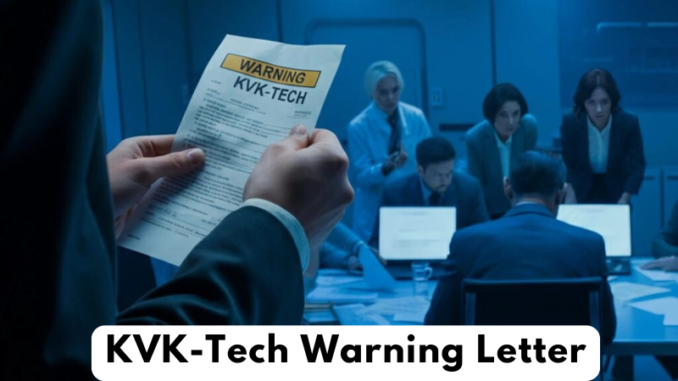
Introduction
The pharmaceutical industry operates under stringent regulatory frameworks designed to safeguard public health. Central to this framework is the issuance of warning letters by authoritative bodies like the U.S. Food and Drug Administration (FDA). These warning letters serve as formal notifications highlighting regulatory non-compliance and demanding corrective action. Recently, KVK-Tech, a prominent pharmaceutical manufacturer, received an FDA warning letter that illuminated several critical compliance issues. This article delves deeply into the specifics of the KVK-Tech warning letter, its implications, the corrective measures undertaken, and broader lessons for the pharmaceutical industry.
Understanding FDA Warning Letters
FDA warning letters are critical components of regulatory oversight. They serve as official communications from the FDA to companies that have failed to meet compliance standards. These letters are issued when significant violations are observed during inspections, audits, or reviews. Such violations can pertain to issues like product quality, manufacturing practices, labeling, or record-keeping. For KVK-Tech, the warning letter signaled serious concerns about their manufacturing processes and regulatory adherence.
An FDA warning letter not only demands immediate corrective action but also serves as a public document that can impact a company’s reputation. Addressing the issues cited is essential to avoid further legal repercussions, such as product recalls, fines, or operational shutdowns.
Details of the KVK-Tech Warning Letter
The KVK-Tech warning letter provided a detailed account of several regulatory violations identified during an FDA inspection. The critical issues highlighted include:
- Inadequate Quality Control Procedures: The inspection revealed lapses in KVK-Tech’s quality assurance processes, including insufficient oversight and verification of product standards.
- Deficiencies in Equipment Maintenance and Sanitation: The FDA noted poor maintenance practices that could compromise product safety. Sanitation protocols were also found lacking, increasing the risk of contamination.
- Insufficient Documentation Practices: Accurate and thorough documentation is vital for tracking production processes and ensuring regulatory compliance. The FDA identified gaps and inaccuracies in KVK-Tech’s record-keeping.
- Failure to Adhere to Good Manufacturing Practices (GMP): GMP violations are serious and can directly affect product quality. The FDA found several deviations from standard GMP guidelines in KVK-Tech’s operations.
These violations not only affect product safety but also erode consumer trust and brand integrity.
Impact on KVK-Tech’s Operations
Receiving an FDA warning letter has far-reaching implications for any pharmaceutical company. For KVK-Tech, the immediate consequences included:
- Regulatory Scrutiny: The company faced increased monitoring and inspections from the FDA to ensure compliance.
- Potential Product Recalls: If non-compliant products were already in the market, there was a risk of mandatory recalls, leading to financial losses and brand damage.
- Operational Disruptions: Addressing the violations required temporary halts in certain operations to implement corrective measures.
- Reputational Damage: Negative publicity surrounding the warning letter could lead to a loss of trust among healthcare providers, stakeholders, and consumers.
Addressing these challenges promptly and effectively is crucial for KVK-Tech to mitigate risks and restore normal business operations.
Steps Taken by KVK-Tech to Address Compliance Issues
In response to the FDA’s warning letter, KVK-Tech implemented a comprehensive action plan to rectify the identified deficiencies. Key measures included:
- Revamping Quality Control Protocols: The company overhauled its quality control framework, introducing stricter verification processes and enhanced oversight mechanisms.
- Conducting Comprehensive Staff Training Programs: KVK-Tech prioritized educating its workforce on regulatory compliance, GMP standards, and the importance of accurate documentation.
- Enhancing Documentation and Record-Keeping Processes: New protocols were introduced to ensure thorough and precise documentation of all manufacturing processes, facilitating better traceability and accountability.
- Upgrading Equipment Maintenance and Sanitation Procedures: The company invested in modernizing equipment maintenance practices and established rigorous sanitation protocols to eliminate contamination risks.
These corrective actions are intended to ensure long-term compliance, restore regulatory trust, and protect consumer safety.
Industry-Wide Implications of FDA Warning Letters
The warning letter issued to KVK-Tech serves as a crucial reminder to the entire pharmaceutical industry about the importance of regulatory compliance. Key takeaways for the industry include:
- The Necessity of Stringent Quality Controls: Consistent oversight and rigorous quality assurance protocols are vital to maintain product integrity.
- The Importance of Documentation: Accurate record-keeping not only ensures compliance but also aids in identifying and rectifying process deficiencies.
- The Value of Proactive Audits: Regular internal audits can help identify potential compliance issues before they attract regulatory scrutiny.
- Long-Term Impact on Brand Reputation: Regulatory violations can damage brand image and consumer trust, emphasizing the need for transparency and accountability.
Importance of Good Manufacturing Practices (GMP)
Good Manufacturing Practices (GMP) are critical guidelines that govern the production, testing, and quality assurance of pharmaceutical products. For KVK-Tech, lapses in GMP were at the core of the FDA’s concerns. Understanding the significance of GMP is essential:
- Consistency in Production: GMP ensures that products are consistently produced under controlled conditions, minimizing variability and ensuring uniform quality.
- Enhanced Safety: By adhering to GMP, companies can prevent contamination, mix-ups, and errors that could compromise patient safety.
- Regulatory Compliance: Following GMP is not just a best practice but a legal requirement. Non-compliance can result in regulatory actions, including warning letters and product recalls.
Regulatory Oversight and Its Role in Pharmaceutical Safety
Regulatory bodies like the FDA are instrumental in safeguarding public health. Their role extends to setting standards, conducting inspections, and enforcing compliance. The KVK-Tech warning letter highlights several aspects of regulatory oversight:
- Routine Inspections: These ensure ongoing compliance with established standards.
- Guidance and Support: Regulatory bodies offer resources and guidance to help companies meet compliance requirements.
- Enforcement Actions: In cases of non-compliance, actions such as warning letters, fines, and recalls are initiated to protect public health.
Understanding and respecting the role of regulatory oversight is essential for maintaining high standards in pharmaceutical production.
How Warning Letters Affect Consumer Trust
Trust is a cornerstone of the pharmaceutical industry. The KVK-Tech warning letter could potentially erode consumer confidence in the company’s products. To mitigate this:
- Transparency is Key: Communicating openly about corrective actions can reassure stakeholders.
- Commitment to Quality: Demonstrating a firm commitment to rectifying violations and enhancing product quality can rebuild trust.
- Proactive Engagement: Engaging with healthcare professionals and the public to educate them on the steps being taken can further bolster credibility.
Preventative Measures to Avoid Future Warning Letters
Preventing regulatory violations requires a proactive approach. Pharmaceutical companies can consider the following strategies:
- Regular Internal Audits: These can help identify and rectify potential compliance gaps.
- Continuous Staff Training: Educating employees about regulatory standards and GMP is essential for maintaining compliance.
- Robust Quality Assurance Systems: Implementing comprehensive quality control systems ensures product integrity.
- Staying Updated with Regulations: The regulatory landscape evolves constantly. Staying informed about changes helps companies remain compliant.
FAQs
What is an FDA warning letter?
An FDA warning letter is an official notice sent to companies that have violated regulatory requirements. It details the specific issues identified and requires corrective action to be taken promptly.
Why did KVK-Tech receive a warning letter?
KVK-Tech received the warning letter due to deficiencies in quality control, inadequate documentation practices, lapses in equipment maintenance, and failure to adhere to Good Manufacturing Practices (GMP).
How can pharmaceutical companies avoid FDA warning letters?
Companies can avoid warning letters by implementing robust quality assurance systems, conducting regular audits, ensuring accurate documentation, and continuously training staff on regulatory requirements.
What are the consequences of not addressing an FDA warning letter?
Failure to address an FDA warning letter can result in serious penalties, including product recalls, financial losses, legal action, and potential suspension of operations.
How did KVK-Tech respond to the warning letter?
KVK-Tech responded by implementing corrective actions such as enhancing quality control protocols, improving sanitation and maintenance procedures, providing staff training, and revamping documentation processes.
See Also: Isac Hallberg
Conclusion
The KVK-Tech warning letter highlights the critical importance of regulatory compliance in the pharmaceutical industry. Addressing the identified violations with urgency and transparency not only helps restore regulatory trust but also reinforces consumer confidence. For KVK-Tech, the path forward involves adhering to GMP, maintaining stringent quality controls, and ensuring thorough documentation practices.
This case also serves as a broader lesson for the industry, underscoring the importance of diligence, proactive engagement, and continual improvement. By prioritizing these principles, pharmaceutical companies can safeguard public health, maintain market reputation, and achieve sustainable success.

Leave a Reply